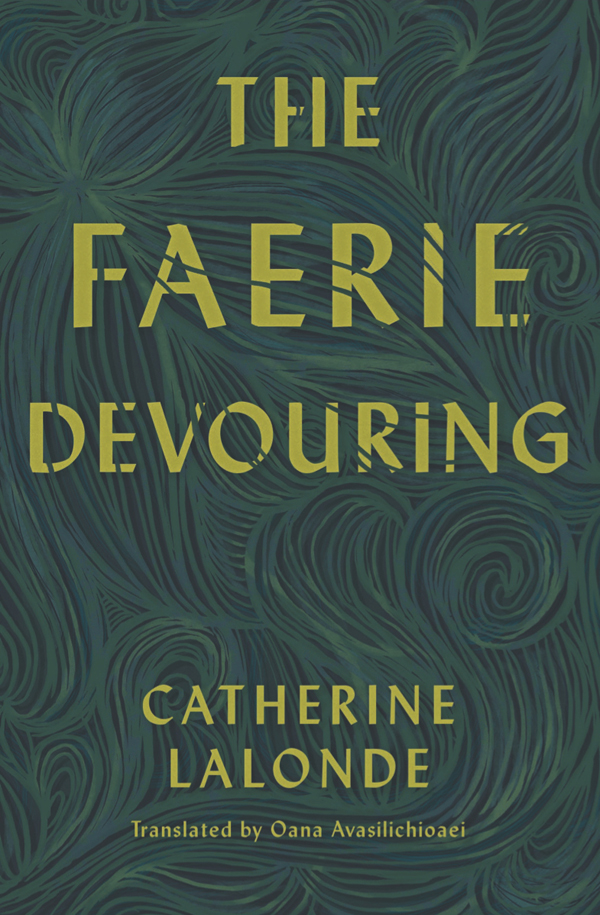Ferocious Fearlessness: In Conversation with Catherine Lalonde and Oana Avasilichioaei, author and translator of The Faerie Devouring

The Faerie Devouring is a modern-day fable and feminist bildungsroman by Quebecois author Catherine Lalonde and reimagined by the award-winning poet and translator Oana Avasilichioaei. The Faerie Devouring tells the story of the sprite, her absent mother (who dies in childbirth), and a brood of fatherless boys all raised by Gramma, a stalwart matriarch and wicked faerie godmother. From her rural childhood with its crudeness and toil to an urban rebellion with its glittering pleasures, the sprite struggles with and ultimately overcomes the burden of genealogy.
Knife Fork Book recently listed The Faerie Devouring in their 2018 Picks. Erin Moure calls it “every gal’s story” and adds, “she [Catherine Lalonde] makes us live as sprites and sisters and grammas and dead moms, and in her turned tables, the penal colony is the human family in its stink and whine and scream and will to life.”
For this edition of our In Conversation series, Book*hug intern Mary Ann reached out to Catherine and Oana to discuss The Faerie Devouring, the translation process behind the book, and more.
❧
Tell us about your book and how it came to be. What inspired you to write this book?
Catherine Lalonde: It got there through a long and sinuous process. It started with the pastiche of Josée Yvon’s work and with a desire to see if I could eradicate a form of violence by stating it out loud, so very loudly. This didn’t work. At all. So the text, kneaded by my questions and the ones of my initial publisher, Éric de Larochellière, twisted itself in strange and beautiful loops and ways in order to liberate itself and its principal character from this violence. It was supposed to be a denunciation; it became a liberation.
Can you speak to the editorial process? Were there any obstacles in translating this book?
Oana Avasilichioaei: While every literary translation has its own unique challenges, translating The Faerie Devouring required a good amount of boldness and imagination. The book poetically employs the fable’s art of storytelling, at times becoming almost an incantation, and Catherine skillfully uses many linguistic registers, including vocabularies of nature and science, the rural and the urban, the body and the fantastical. The language is always very specific and resonant, as Catherine also references and often reinvents old Quebecois idioms, sayings, lullabies, expressions. As such, I had to lend an ear to all these lexicons and registers and to the specificity and musicality of the phrases, as well as find (semi)equivalent English idiomatic expressions, while also making sure to retain a certain rawness and spontaneity in the text.
The Faerie Devouring also tackles some sensitive subject matter and taboos. It challenges readers in a variety of ways, for example, as it speaks to the impact and traces of certain prejudices. Although I carefully considered how I handled this in English, and the very fact that the book risks and challenges is in part why it was important to translate it and make it available to an English public, I still find that some readers will see these challenges as strengths in the book, while others will see them as obstacles.
Which writers and books do you think have been the most influential to your work on The Faerie Devouring?
CL: I took a lot of writers with me along for the ride of composing The Faerie. It all started with a pastiche of Josée Yvon, one of Québec’s most radical and amazing poets whose work is just starting to receive the recognition it should have always had. That pastiche ultimately disappeared and mutated into a more personal and subtle homage. Traces of women writers from the same era also emerged along the way, including Denise Boucher (The Fairies Are Thirsty) and France Théoret (Bloody Mary, Nécessairement putain). Also Anne Hébert (Children of the Black Sabbath, Burden of Dreams): I wanted to make her devour Josée Yvon. The language was clearly inspired by Hervé Bouchard (Mailloux) and Olivier Cadiot (Retour définitif et durable de l’être aimé, Fairy Queen, Colonel Zoo). I also know that I am indelibly marked, like so many Quebecers, by my reading of Réjean Ducharme’s books. I got some ideas from Pascal Quignard, particularly the idea that our parents’ night of love when we are conceived remains for us a scene that is both mythical and infinitely taboo. Reading the French Céline Minard (Bastard Battle), Emmanuelle Bayamack-Tam (Si tout n’a pas péri avec mon innocence), and Maggie Nelson (The Argonauts) towards the end of the process gave me a beautiful permission to go deeper, whatever that might have meant.
How did the writing style of The Faerie Devouring impact your work as a translator? In what ways is this book different from other books you’ve translated?
OA: In a way, this book is perhaps the one that has the most ample blend of idioms and registers of the books I have translated. It is so firmly buoyed by regional expressions yet also so resolutely contemporary in its hybrid nature. And I generally find that the more specific the writing style, the bolder and more realized a voice is, the more one has to write the translation.
In translating this book from French to English, what was the most important aspect or quality of The Faerie Devouring that you wanted to make sure carried over from one language to the other?
OA: I think this would have to be the intense specificity of the languages used combined with the musical flow and breathless quality of the phrasing. This meant expending much effort and going through several drafts and re-writing (as well as generous conversations with Catherine) to achieve a layered English text that sings with ease as though it has been almost effortless.
What are you hoping readers ultimately take away from this book?
OA: I feel this is ultimately a hopeful book; it is a telling of struggle and abject circumstances, yet also one full of life, of survival, of finding ways through despite great challenges.
CL: I think more in terms of space, or territory, than in terms of readers’ impressions, even though I do consider those to some degree. I work better if I don’t really know what I’m doing, which means that I really have to search and dig through language. I do have a pretty clear idea of the intimate and social areas I want to activate through language. With The Faerie, I discovered what my “expectations and results” were afterwards from readers’ comments. It has to do with the power and permission one gives oneself, and it touches me—I have to say, apolitically—more when it comes from women who have been hurt in their childhood, sexuality, and bodies, and more so from women artists, and even more from younger women writers.
What are you currently working on? Are there certain influences or lessons you’ll be taking from this project into the next?
OA: I greatly admire and appreciate the book’s ferocious fearlessness. I hope to approach all my creative projects (writing, sound, translation) with such curiosity and boldness. For instance, one of my current projects is writing a libretto for an opera, which attempts to show how resilience through imagination is possible in circumstances of solitary confinement and corruption due to absolute power, and as such requires a bold and fearless approach to the writing.
CL: The lesson is that it is way more challenging, interesting, and complicated if I find a way for the text to escape my own initial will and intentions: doubting, kneading, questioning, mixing, cutting, taking the heart away and replacing it by something different to see what changes. Then I discover writing with a real and pure curiosity. Yet this also makes it irrelevant to talk about what I plan to write, because it too will change.
❧
Order your copy of The Faerie Devouring here.
 Catherine Lalonde lives in Montreal. Her publications include Cassandre (2005), and Corps étranger (2008; winner of the Émile-Nelligan Award) and La dévoration des fées (2017; finalist for the 2018 Governor General’s Literary Awards; finalist for the 2018 Grand Prix du Livre de Montral; winner of the 2018 Prix Alain-Grandbois de l’Academie des lettres du Quebec.) She works as a journalist for the Montreal daily Le Devoir.
Catherine Lalonde lives in Montreal. Her publications include Cassandre (2005), and Corps étranger (2008; winner of the Émile-Nelligan Award) and La dévoration des fées (2017; finalist for the 2018 Governor General’s Literary Awards; finalist for the 2018 Grand Prix du Livre de Montral; winner of the 2018 Prix Alain-Grandbois de l’Academie des lettres du Quebec.) She works as a journalist for the Montreal daily Le Devoir.
 Montreal-based writer, translator, and editor Oana Avasilichioaei has published five poetry collections, including Expeditions of a Chimaera (with Erín Moure; 2009), We, Beasts (2012; winner of the A.M. Klein Prize for Poetry from the Quebec Writers’ Federation) and Limbinal (2015). Previous translations include Bertrand Laverdure’s Universal Bureau of Copyrights (2014; shortlisted for the 2015 ReLit Awards), Suzanne Leblanc’s The Thought House of Philippa (cotranslated with Ingrid Pam Dick; 2015), and Daniel Canty’s Wigrum (2013). Her translation of Bertrand Laverdure’s Readopolis won the 2017 Governor General’s Literary Award for Translation.
Montreal-based writer, translator, and editor Oana Avasilichioaei has published five poetry collections, including Expeditions of a Chimaera (with Erín Moure; 2009), We, Beasts (2012; winner of the A.M. Klein Prize for Poetry from the Quebec Writers’ Federation) and Limbinal (2015). Previous translations include Bertrand Laverdure’s Universal Bureau of Copyrights (2014; shortlisted for the 2015 ReLit Awards), Suzanne Leblanc’s The Thought House of Philippa (cotranslated with Ingrid Pam Dick; 2015), and Daniel Canty’s Wigrum (2013). Her translation of Bertrand Laverdure’s Readopolis won the 2017 Governor General’s Literary Award for Translation.

